
Prof David Matchar, Inaugural Director (Emeritus), Health Services and Systems Research Programme of Duke-NUS and Jeff Bote, General Manager of Upjohn Singapore, Malaysia and Brunei signs MoU to set up ASEAN Centre of Excellence for Real World Evidence (RWE) Studies
Upjohn, a division of Pfizer, on 7 Nov 2019, signed a Memorandum of Understanding (MoU) with Duke-NUS Medical School, Singapore's only graduate-entry medical school, to establish a Real World Evidence (RWE) studies training curriculum for ASEAN policymakers and study conductors to standardize research methodologies across the region. Moreover, the partnership also signifies the establishment of Duke-NUS as the initiative’s region Centre of Excellence (CoE), providing support and leadership given their expertise and knowledge to utilize the increasing amounts of real-world data actively generated during routine care.
The program was devised as part of Upjohn’s commitment to reduce the burden of non-communicable diseases (NCDs) in South East Asia, such as cardiovascular disease, diabetes, depression and smoking-related diseases, which are responsible for almost 8.5 million deaths in the region.
The MoU was signed by Jeff Bote, General Manager of Upjohn Singapore, Malaysia and Brunei, and Dr
David Matchar, Inaugural Director (Emeritus), Health Services and Systems Research Programme of DukeNUS. The agreement provides for cooperation between the two partners to educate ASEAN policymakers and the conductors of RWE studies around the workings and methodologies, enabling more efficient cross-sharing of knowledge through standardized data sets which will eventually translate into policies for public health.
“This groundbreaking partnership and training curriculum, based on Systems Thinking, will make a real difference to how RWE studies are commissioned and conducted in the region. We are very excited to be partnering with Duke-NUS to establish this initiative given the heightened focus and recognition on the insights derived from real-world data to improve decision making and patient care.” said Jeff Bote. “While this is the first time both organizations are coming together, it will definitely not be the last.”
Dr David Matchar welcomed the collaboration and said, “It has always been the School’s mission to provide innovative education and impactful research, and this collaboration will help both policymakers and conductors of RWE studies be more knowledgeable and better-equipped to commission and conduct these much-needed programs.”
He added, “While we have seen the shift towards the use of RWE studies in the past decade, there is still a general lack in understanding of the optimum model to address often complex policy problems. In addition to difficulties establishing key questions, challenges include data privacy concerns as well as inadequate policies and incentives to promote data capture. These barriers have resulted in unaddressed gaps, some of which include the underutilization of data as well as a misalignment between policy questions and methodologies. All of these point towards a need to better support policymakers in using RWE studies to enact better healthcare policies.”
Dr Anurita Majumdar, Regional Medical Lead of Upjohn said, “Certain factors such as unhealthy diets, tobacco use, physical inactivity and air pollution are contributing to a rise in certain NCDs around and the world and across South East Asia. In fact, 62% of all deaths are now due to NCDs meaning that action is needed now more than ever. One area that is key to driving understanding of the issues and improving people’s health is the use of real-world evidence studies. However, these studies require consistency and accuracy if they are to be of real value. This new initiative from Duke-NUS and Pfizer Upjohn will aim to train real-world evidence analysts in the South East Asian region to conduct and develop trials and empower policymakers and physicians to make informed choices.”
The curriculum is designed for both policymakers as well as conductors of RWE studies. The training for the former is a one-off workshop which lasts two days, provides an overview of a typical RWE study and introduces the various benefits and challenges of commissioning and conducting these programs. For the conductors, the two-week program will be carried out in two one-week sessions, six months apart, where the curriculum will deep dive into the details of Systems Thinking on a live project.
“Systems Thinking is a core skill in public health and helps policymakers build programs and devise policies that are able to withstand unintended situations. This skill set also includes the knowledge to integrate multiple perspectives and synthesize them into a framework or model that can accurately describe and predict the various ways in which a system might react to policy changes,” said Dr Wee Hwee Lin, Assistant Professor, NUS Saw Swee Hock School of Public Health.
Attendees for the curriculum will be co-invited by both Upjohn and Duke-NUS in the first quarter of 2020. The attendee list will be announced in due time.




